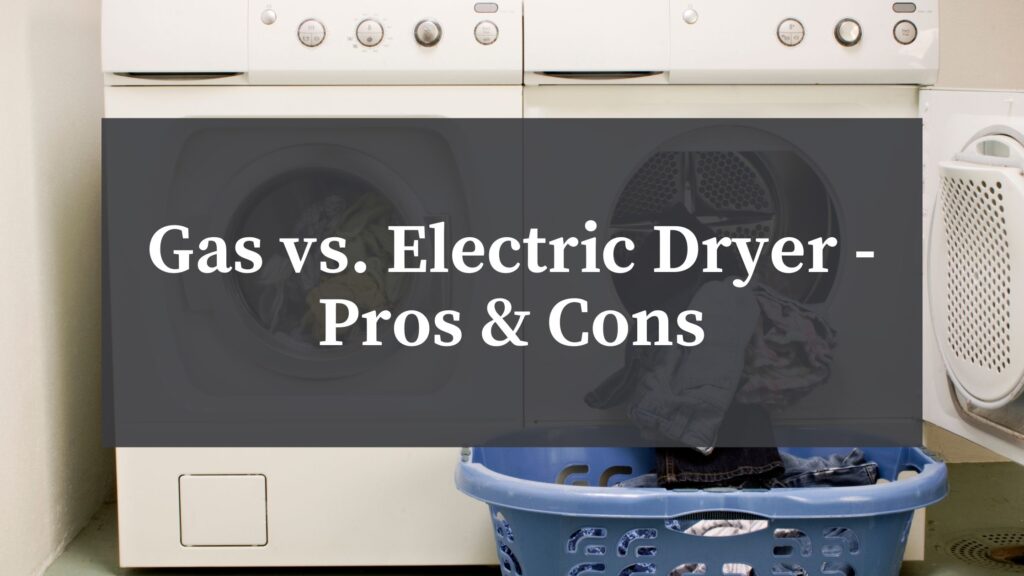
Gas or Electric–Is One Better Than the Other?
So your dryer conks out and is beyond repair. Other than hanging your laundry out on the line (assuming your homeowner’s association allows it), what are your options? Do you decide to go for an electric dryer or a gas dryer?
What’s the difference? Is one better than the other?
Gas and electric dryers both work the same way. You put your wet clothes in a drum. As the drum turns and tumbles the clothes, heat removes moisture from the clothes until they are dry.
Let’s take a look at the pros and cons of gas versus electric dryers to form a basis for making the best decision for your personal needs and specific home situation:
- Is your old dryer gas or electric?
- Upfront cost: gas vs. electric dryer
- Energy efficiency: gas vs. electric dryer
- Operating expense: gas vs. electric dryer
- Other considerations: gas vs. electric dryer
- Talk to an appliance expert
Is Your Old Dryer Gas or Electric?
If your utility service doesn’t provide gas service, then you might not need to read further. But, go ahead, as you could add a propane tank (especially if you prefer cooking on a gas stove); however, this also requires a propane conversion kit as the factory standard is for a natural gas hookup. Otherwise, the choice of electric dryer is already made for you.
How do you know if your dryer is gas or electric? It’s quite easy. Electric dryers require a 240-volt outlet (everything else in your house is 120-volt). The electrical cord has three or four prongs that don’t look like your average household electrical cord plug and can’t plug in anywhere else but in a dedicated 240-volt outlet.
This of course means that if your old dryer is a gas model and you decide to replace it with electric, you need to install a dedicated 240-volt outlet, so that added expense should go into your purchasing calculation.
You may have the option to use either an electric or gas dryer. Let’s look at the pros and cons of each.
Upfront Cost: Gas vs. Electric Dryer
Most manufacturers make both gas and electric dryers. On average, a gas dryer costs about $100 more than an electric dryer. However, gas dryers are more energy efficient and, as we’ll see, cost less to operate, so over time you recover that upfront cost.
Energy Efficiency: Gas vs. Electric Dryer
Gas is more energy efficient than electricity. You aren’t relying on a power plant burning fossil fuels hundreds of miles away generating electricity that travels throughout the power grid and transmission wires, where some of that energy is lost due to resistance in the wires. When that electricity is then used to generate heat in your dryer, there is an additional energy loss.
Gas, on the other hand, instantly provides heat upon combustion with minimal heat loss. According to the Northwest Gas Association, you lose up to 68 percent of electricity’s original energy value when you turn on an electric appliance. That means the full fuel cycle efficiency is about 32 percent (100-68=32). By comparison, a natural gas appliance’s full fuel cycle efficiency is about 92 percent. So there’s a big difference in energy efficiency.
Gas dryers also don’t overdry clothes the way some electric dryers can. That means you aren’t wasting energy on drying clothes that are already dry. And that means a gas dryer is not only more energy efficient, but also reduces general wear and tear on your garments.
Greater energy efficiency also means gas dryers are more environmentally friendly than electric dryers. The one exception is if you are using solar panels to generate electricity for your home, rather than relying on a power plant that burns fossil fuels.
Operating Expense: Gas vs. Electric Dryer
For many homeowners, the primary concern in the gas vs. electric dryer debate is which is cheaper to operate.
It is estimated that the average family does some 400 loads of laundry a year, or seven loads a week. That accounts for about eight percent of average family utility costs. When you compare gas vs. electric dryers, the option of gas can reduce that percentage.
A gas dryer heats up more quickly than electric and also gets hotter. This is why gas-dried clothes experience less static cling. It is also why gas dryer cycle times are shorter than electric dryers. Which means that for the average family, generally speaking, you could expect to save anywhere from $20 to $40 a year on operating expenses if you go gas instead of electric (individual mileage of course does vary). Remember we said gas dryers cost about $100 more than electric dryers. You can recover that cost within anywhere from two-and-a-half to five years, and everything afterwards is money back in your pocket.
Other Considerations: Gas vs. Electric Dryer
While it might seem gas is the better choice over an electric dryer, assuming of course you have gas service, there are other considerations that favor electric. Electric dryers don’t require vents, because unlike gas they do not produce carbon monoxide. Electric dryers also don’t require, obviously enough, gas hookups, so they can fit just about anywhere you can put a 240-volt outlet.
Electric dryer repairs are also generally less costly since you don’t have to deal with the gas hookup in addition to the problem in the appliance itself. Gas dryers have more parts that can go bad; these include the gas valve coil, solenoid valve, gas connector, ventilation components, and igniter. The lack of these parts is also why electric dryers aren’t as heavy and are easier to move.
Consult the Dryer Appliance Experts
BSC carries both gas and electric leading brand dryers. We’re here to help you choose the dryer—gas or electric—that best fits your needs and your budget.
Whether gas or electric, every dryer we sell includes installation and delivery. Your dedicated Enjoy Life Counselor ensures error-free delivery and installation. You can even track delivery on the day of the appointment.
BSC installation technicians are qualified and insured. Your dryer is installed professionally and to your complete satisfaction. If you prefer, BSC can provide contactless delivery.
Contact us to further discuss the pros and cons of gas vs. electric dryers. You’ll find there are no cons in working with us at BSC.
